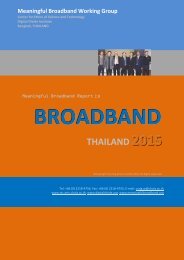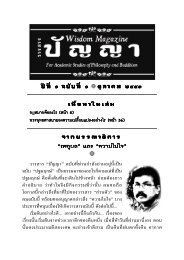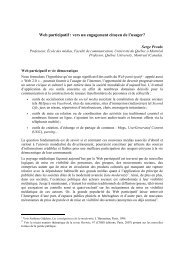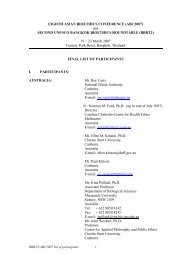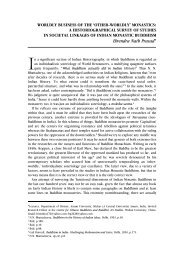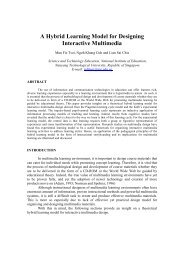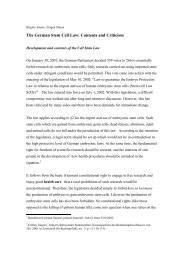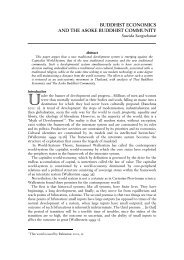Ethics of the Global Digital Divide - Center for Ethics of Science and ...
Ethics of the Global Digital Divide - Center for Ethics of Science and ...
Ethics of the Global Digital Divide - Center for Ethics of Science and ...
Create successful ePaper yourself
Turn your PDF publications into a flip-book with our unique Google optimized e-Paper software.
<strong>Ethics</strong> <strong>of</strong> <strong>the</strong> <strong>Global</strong> <strong>Digital</strong><strong>Divide</strong><strong>Global</strong> Justice, Development <strong>and</strong> PolicyImplications <strong>for</strong> Thail<strong>and</strong>Soraj HongladaromDepartment <strong>of</strong> Philosophy <strong>and</strong> Project <strong>for</strong> <strong>the</strong> <strong>Center</strong> <strong>of</strong> <strong>Science</strong>, Technology <strong>and</strong> SocietyFaculty <strong>of</strong> Arts, Chulalongkorn UniversityA project funded by <strong>the</strong> TRF, under grant number BRG4680020
RationaleAno<strong>the</strong>r thing is that <strong>the</strong> digital divideproblem is interesting in itself <strong>for</strong>philosophical reflection, since it lies at<strong>the</strong> intersection <strong>of</strong> <strong>the</strong> interests <strong>of</strong> social<strong>and</strong> political philosophy, philosophy <strong>of</strong>technology, <strong>and</strong> epistemology, to namebut a few.
Research QuestionsWhat exactly does ‘digital divide’ mean?Is ‘digital divide’ an appropriatecharacterization <strong>of</strong> current trends inin<strong>for</strong>mation technology distribution?What does it actually mean <strong>for</strong> one to beseparated by this ‘divide’ from ano<strong>the</strong>r?
Research QuestionsWhy does <strong>the</strong> divide need to be closed?What else needs to be taken into consideration?Is thinking about this issue essentially <strong>the</strong> sameor different from thinking about <strong>the</strong> familiarindicators <strong>of</strong> social <strong>and</strong> international inequality,such as nutrition (<strong>the</strong> food divide) or income (<strong>the</strong>money divide)?
Research QuestionsHow does <strong>the</strong> digital divide relate toglobalization?What are <strong>the</strong> relations between it <strong>and</strong>local cultures?How can we conceptualize <strong>the</strong> wholeproblem so that we could underst<strong>and</strong> itbetter?
ObjectivesTo analyze <strong>the</strong> conceptual <strong>and</strong> descriptive aspects <strong>of</strong> <strong>the</strong>problem <strong>of</strong> <strong>the</strong> global digital divide so as to gain a fullerunderst<strong>and</strong>ing <strong>of</strong> <strong>the</strong> phenomenon.To find <strong>the</strong> most appropriate normative solutions to <strong>the</strong>problem as related to global justice <strong>and</strong> development <strong>of</strong> asmall state such as Thail<strong>and</strong>.To <strong>of</strong>fer a set <strong>of</strong> policy recommendations on how solutions to<strong>the</strong> global digital divide problem delineated in this projectcontribute to <strong>the</strong> development <strong>of</strong> Thail<strong>and</strong>, <strong>and</strong> how suchrecommendations could serve as an example <strong>for</strong> o<strong>the</strong>r smallstates.
MethodologyDocumentary Research
Expected OutcomeThree articles to be published in leadinginternational journalsThree papers to be presented atinternational conferencesPolicy impact through organization <strong>of</strong>meetings <strong>of</strong> stakeholders <strong>and</strong> mediaoutreaching programs.
Project DurationSeptember 2003 to August 2006
ActivitiesChair, Organizing Committee, The 2nd Asia-PacificComputing <strong>and</strong> Philosophy Conference, January 7-9 2005 (AP-CAP 2005) at Novotel Hotel, inassociation with <strong>the</strong> International Association <strong>of</strong>Computing <strong>and</strong> Philosophy (www.iacap.org)Conference website: http://www.stc.arts.chula.ac.th/CAP/AP-CAP.htmlAttended by 50 paper presenters from more than 15countries.
ActivitiesFollow up activities from <strong>the</strong> conference includepublication <strong>of</strong> three volumes:Computing <strong>and</strong> Philosophy: Selected Papers from<strong>the</strong> 2nd AP-CAP, published by ChulalongkornUniversity Press.One special issue <strong>of</strong> MANUSYA: Journal <strong>of</strong>Humanities on Computer <strong>Ethics</strong>O<strong>the</strong>r articles to be published in regular issues <strong>of</strong>MANUSYA
ActivitiesEditor, toge<strong>the</strong>r with Charles Ess, <strong>of</strong> avolume on In<strong>for</strong>mation Technology<strong>Ethics</strong>: Cultural Perspectives, to bepublished by Idea-Group, Inc.The volume is expected to finish inMarch 2006.
Output So FarSoraj Hongladarom, “Exploring <strong>the</strong> Philosophical Terrain <strong>of</strong> <strong>the</strong> <strong>Digital</strong> <strong>Divide</strong>.”In John Weckert <strong>and</strong> Yeslam Al-Saggaf, eds. Computers <strong>and</strong> Philosophy 2003:Selected Papers from <strong>the</strong> Computers <strong>and</strong> Philosophy Conference (CAP 2003).Conferences in Research <strong>and</strong> Practice in In<strong>for</strong>mation Technology, Vol. 37. 2004.The Australian Computer Society, pp. 85-89.Soraj Hongladarom, “The <strong>Digital</strong> <strong>Divide</strong> in Thail<strong>and</strong>: Past attempts to solve <strong>the</strong>problem <strong>and</strong> <strong>the</strong> need <strong>for</strong> consideration <strong>of</strong> culture.” In Fay Sudweeks <strong>and</strong> CharlesEss, eds. Fourth International Conference on Cultural Attitudes towardsTechnology <strong>and</strong> Communication 2004, pp. 565-569.Soraj Hongladarom, “Electronic Surveillance in <strong>the</strong> Workplace: A BuddhistPerspective.” In John Weckert, ed. Electronic Surveillance in <strong>the</strong> Workplace.Hershey, PA: Idea Groups, 2005.
Output So FarSoraj Hongladarom, “The <strong>Digital</strong> <strong>Divide</strong>, Epistemology <strong>and</strong> <strong>Global</strong> Justice.”Special Issue <strong>of</strong> <strong>the</strong> CSI (Computer Society <strong>of</strong> India) Communications onIn<strong>for</strong>mation <strong>Ethics</strong> 28.12(June 2005). K. Weber, R. Capurro Guest Eds., pp. 5-6.Soraj Hongladarom, “The Asian In<strong>for</strong>mation Society <strong>and</strong> <strong>the</strong> Aims <strong>of</strong> Education.”Journal <strong>of</strong> <strong>the</strong> Pan-Pacific Association <strong>of</strong> Applied Linguistics (<strong>for</strong>thcoming).Soraj Hongladarom, “<strong>Global</strong> <strong>Digital</strong> <strong>Divide</strong>, <strong>Global</strong> Justice, Cultures <strong>and</strong>Epistemology.” Forthcoming from In<strong>for</strong>mation Technology <strong>and</strong> Social Justice,Emma Rooksby ed. Idea-Group Publisher.
Future PlansOrganizing a meeting <strong>of</strong> stakeholders in<strong>the</strong> digital divide problem atChulalongkorn University toward <strong>the</strong>end <strong>of</strong> <strong>the</strong> Project (August 2006).Put all <strong>the</strong> English-language articlestoge<strong>the</strong>r in a volume <strong>and</strong> translate <strong>the</strong>minto Thai <strong>for</strong> <strong>the</strong> Thai audience.



